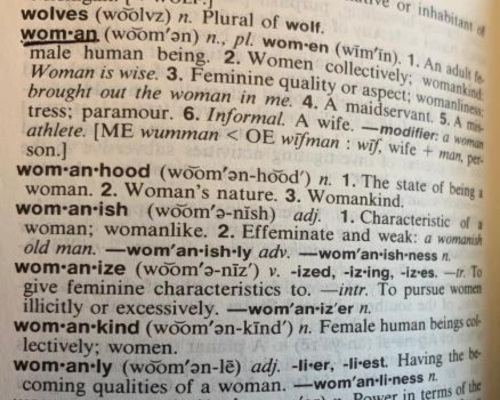Hear me out.
I was at a book signing and someone lost their handbag. One of the organizers of the event used the loudspeaker to ask the “female who lost their handbag to please stop by the information table.” It wasn’t me, so I didn’t think too much of it. But something about the announcement didn’t sound right to my ears. As we approached the author’s table to get our book signed, I heard someone near me say “female WHAT? Female isn’t a NOUN!” Ah! There it is. The announcement didn’t sound right because it wasn’t grammatically correct.
It got me thinking. I had been hearing female used as a noun in song lyrics and in pop culture for a while now. But here I was, surrounded by book people, talking to a successful and talented author and someone thought it was important enough to correct the announcer out loud. I was intrigued.
I looked up some definitions:
Woman: Noun. A female human being.
Female: Adjective. Of or denoting the sex that can bear offspring or produce eggs, distinguished biologically by the production of gametes (ova) which can be fertilized by male gametes.
So a woman can stand at the front of the room. Or a female scientist can stand at the front of the room. A woman scientist can stand at the front of the room because that is a compound subject/noun. But a female can’t stand anywhere because a female isn’t a thing, it’s a descriptor of a thing. (Also, it’s okay to just talk about scientists with no qualifiers at all!)
So what happens when you use female as a noun? You could sound like someone who writes pop culture song lyrics. Not necessarily a bad thing, depending on your audience. Or you could sound like someone who doesn’t understand grammar. Probably a bad thing, again depending on your audience. But here is the bigger problem: by using female as a noun, you can systematically create an environment where women are not only unequal, but where women are seen as a different species entirely — not human but chattel.
Take for example pairing the words man-female, like if someone were to write “a man and a female walk down the street.” Man, like the word woman, is a noun reserved entirely for the human species. But since female is an adjective, it is used in all kinds of scientific ways to denote specific sex characteristics. There are female parts to plants. You can have a female dog or fish or gerbil. By using the noun man paired with the adjective female, the author suggests the man walking down the street is human, but the other being isn’t. In this way, seemingly benign language choices are anything but. By using the word female as a noun, we allow the dehumanization of women in our speech and writing. I hope we can all agree this is dangerous.
No one likes having their grammar called out. But sometimes, we need to hold each other accountable for our word choices. How we talk about each other, how we “other” those different from us, and what we allow to go unchecked around us, can have lasting consequences far beyond what is said or written in the moment. Knowing when to use a noun and when to use an adjective can actually help us, help our society, as we strive for equality, unity, and peace for all.


0 Comments